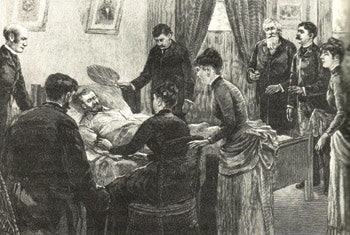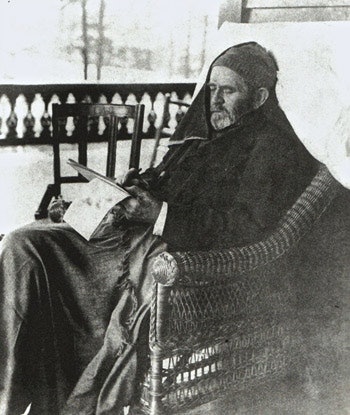Grant’s Final Battle
David H. Darrow, MD, DDS In 1879, having failed to win a third Republican nomination for president, Ulysses S. Grant relocated to New York City with his wife, Julia. A career soldier and statesman, Grant had no special skills to rely on for regular income, and had declined offers to publish his memoirs. Encouraged by his son, Buck, he chose instead to lend his money and his name to investors Ferdinand Ward and James Fish; along with Buck, the four established the banking and brokerage firm of Grant & Ward. Although the firm initially thrived, the Grants discovered in 1884 that Ward and Fish had engaged in a Ponzi scheme. Grant & Ward collapsed, and Ward and Fish were eventually convicted and imprisoned. The Grants were bankrupt and moved out of the city with the assistance of donations. Concerned about his legacy and his family’s financial situation, Grant finally agreed to author four articles, and entered initial discussions for a book. At about the same time, while eating a peach, Grant noted a sore area in his throat. By the time he was referred to otolaryngologist John H. Douglas more than three months later, his exam revealed “…a scaly squamous inflammation, strongly suggestive of epithelial trouble.” Also noted were rigidity of the right tongue base and a nodule in the right neck. That Grant was an avid smoker of cigars is no secret. Many accounts suggest he smoked 10 to 20 cigars a day. The degree to which he consumed alcohol is debated, but it is clear that Grant was no stranger to the bottle. Grant stopped smoking and started topical therapies including various gargles and 4 percent cocaine for pain. His physicians, however, ruled out surgery. Increasingly aware of his ultimate fate, Grant decided to author his memoirs so the royalties could provide Julia with an income. He accepted an offer from Samuel Clemens (Mark Twain) to use Twain’s publishing company and agreed to a 75 percent royalty. The subsequent months became a public race to complete his memoirs before his death. As his disease advanced, Grant fought through bouts of hemoptysis and airway obstruction, often choosing to sleep seated to avoid suffocation. Despite the circumstances, Grant continued to write an average of about 750 words a day. Grant’s writing was completed by early July, but revisions had to be completed by Twain and Grant’s son Frederick. The book was completed on July 20, 1885, three days before his death. It is estimated that, in his final victory, Grant left to Julia about $450,000 in royalties.
 Illustration of General Grant’s death from Harper’s Weekly, August 1, 1885. Dr. Douglas is second from the left.
Illustration of General Grant’s death from Harper’s Weekly, August 1, 1885. Dr. Douglas is second from the left.http://www.encore-editions.com/the-death-of-general-grant-at-mount-mc-gregor-saratoga-co-new-york-july-23rd-1885.
David H. Darrow, MD, DDS
In 1879, having failed to win a third Republican nomination for president, Ulysses S. Grant relocated to New York City with his wife, Julia. A career soldier and statesman, Grant had no special skills to rely on for regular income, and had declined offers to publish his memoirs. Encouraged by his son, Buck, he chose instead to lend his money and his name to investors Ferdinand Ward and James Fish; along with Buck, the four established the banking and brokerage firm of Grant & Ward.
Although the firm initially thrived, the Grants discovered in 1884 that Ward and Fish had engaged in a Ponzi scheme. Grant & Ward collapsed, and Ward and Fish were eventually convicted and imprisoned. The Grants were bankrupt and moved out of the city with the assistance of donations.
Concerned about his legacy and his family’s financial situation, Grant finally agreed to author four articles, and entered initial discussions for a book. At about the same time, while eating a peach, Grant noted a sore area in his throat. By the time he was referred to otolaryngologist John H. Douglas more than three months later, his exam revealed “…a scaly squamous inflammation, strongly suggestive of epithelial trouble.” Also noted were rigidity of the right tongue base and a nodule in the right neck.
 Grant writing his memoirs at Mt. McGregor, NY. The photo appeared in The Century Magazine, July 1908.
Grant writing his memoirs at Mt. McGregor, NY. The photo appeared in The Century Magazine, July 1908.That Grant was an avid smoker of cigars is no secret. Many accounts suggest he smoked 10 to 20 cigars a day. The degree to which he consumed alcohol is debated, but it is clear that Grant was no stranger to the bottle. Grant stopped smoking and started topical therapies including various gargles and 4 percent cocaine for pain.
His physicians, however, ruled out surgery. Increasingly aware of his ultimate fate, Grant decided to author his memoirs so the royalties could provide Julia with an income. He accepted an offer from Samuel Clemens (Mark Twain) to use Twain’s publishing company and agreed to a 75 percent royalty.
The subsequent months became a public race to complete his memoirs before his death. As his disease advanced, Grant fought through bouts of hemoptysis and airway obstruction, often choosing to sleep seated to avoid suffocation. Despite the circumstances, Grant continued to write an average of about 750 words a day.
Grant’s writing was completed by early July, but revisions had to be completed by Twain and Grant’s son Frederick. The book was completed on July 20, 1885, three days before his death. It is estimated that, in his final victory, Grant left to Julia about $450,000 in royalties.
















